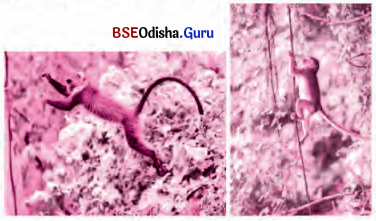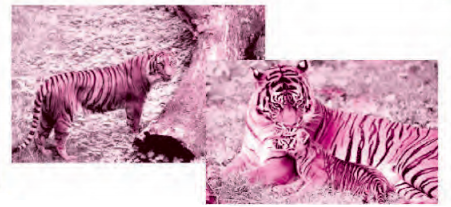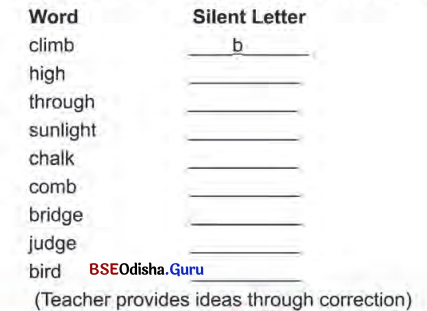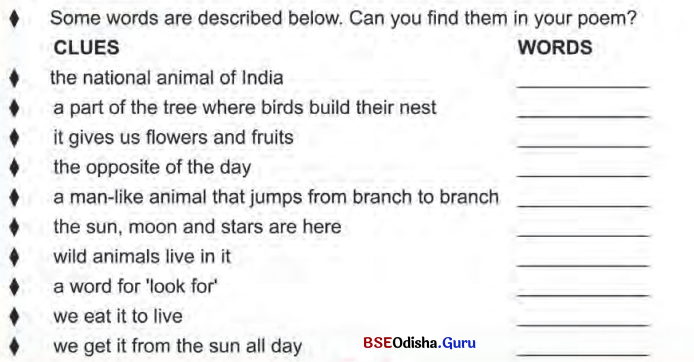Odisha State Board BSE Odisha 7th Class English Solutions Lesson 1 I’d Like to Be…. Textbook Exercise Questions and Answers.
Class 7th English Chapter 1 I’d Like to Be Question Answers BSE Odisha
I’d Like to Be Class 7 Questions and Answers
Session – 1 (ଶବ୍ଦାବଳୀ)
I. Pre-Reading (ପୂର୍ବ ପ୍ରସ୍ତୁତି)
- Socialization (ସାମାଜିକୀକରଣ):
- Teacher will ask (ଶିକ୍ଷକ ପଚାରିବେ):
Question 1.
What do you want to be in future? (Students will reply).
(ତୁମ୍ଭେମାନେ ଭବିଷ୍ୟତରେ କ’ଣ ହେବାକୁ ଇଚ୍ଛା କର ?) (ଛାତ୍ରଛାତ୍ରୀମାନେ ଉତ୍ତର ଦେବେ)
Answer: I want to be a soldier in future.
Next, s/he will help the students do the following chain-drill activity.
(ପରେ ପରେ ଶିକ୍ଷକ ଛାତ୍ରଛାତ୍ରୀମାନଙ୍କୁ ନିମ୍ନୋକ୍ତ ଶୃଙ୍ଖଳ-ଅଭ୍ୟାସ କାର୍ଯ୍ୟାବଳୀରେ ସାହାଯ୍ୟ କରିବେ ।)
(Teacher writes the following text on the blackboard)
(ଶିକ୍ଷକ ବ୍ଲାକବୋର୍ଡରେ ନିମ୍ନଲିଖିତ ପାଠ ଲେଖନ୍ତି |)
I’m __________ (name).
I want to be a __________.
What’s about you?
After the chain-drill is over, the teacher will say :
(ଜଣ ଜଣ କରି ସମସ୍ତଙ୍କୁ ଶୃଙ୍ଖଳ ଅଭ୍ୟାସ ସମାପନ ପରେ ଶିକ୍ଷକ କହିବେ:)
All of you told what you want to become in future.
(ତୁମ୍ଭେମାନେ ସମସ୍ତେ ଭବିଷ୍ୟତରେ କ’ଣ ହେବାକୁ ଚାହଁ ବୋଲି କହିଲ ।)
Let’s read a poem and see what the poet wants to be.
(ଆସନ୍ତୁ ଗୋଟିଏ କବିତା ପଢ଼ି ଦେଖିବା କବି କ’ଣ ହେବାକୁ ଚାହୁଁଛନ୍ତି.)
![]()
II. While Reading (ପଠନକାଳୀନ)
Text(ପାଠ୍ୟବସ୍ତୁ)
Read the poem silently and answer the questions that follow.
(କବତାଟିକୁ ନୀରବରେ ପାଠ କର ଏବଂ ନିମ୍ନପ୍ରଦତ୍ତ ପ୍ରଶ୍ନଗୁଡ଼ିକର ଉତ୍ତର ଦିଅ ।)
I’d like to be a monkey
And climb the tree so high,
Jumping from branch to branch
Till I reach the sky.
Playing and skipping all day long
Dancing and eating too!
I’d like to be a monkey.
What about you?

ଓଡ଼ିଆ ଅନୁବାଦ :
ମୁଁ ଗୋଟେ ମାଙ୍କଡ଼ ହେବାକୁ ଭଲ ପାଇବି
ଏବଂ ଉଚ୍ଚ ଉଚ୍ଚ ବୃକ୍ଷସବୁ ଆରୋହଣ କରିବି,
ଡାଳରୁ ଡାଳକୁ ଡେଇଁ ଡେଇଁବି
ଆକାଶକୁ ଛୁଇଁବା ଯାଏ ।
ଖେଳିବି ଏବଂ ଡିଆଁ ମାରିବି ଦିନ ତମାମ
ନୃତ୍ୟକରି ଏବଂ ଖାଦ୍ୟ ଖାଇ ଖାଇ
ହେବି ମୁଁ ଏକ ମାଙ୍କଡ଼
ତୁମ କଥା କ’ଣ?
I’d like to be a tiger
And roam the jungle deep,
Lying in sunlight all day long
Warm and fast asleep.
Searching all night through.
I’d like to be a tiger.
What about you ?

ହେବି ମୁଁ ଏକ ବାଘ
ବୁଲିବି ଘଞ୍ଚ ଜଙ୍ଗଲରେ ଘୂରି ଘୂରି
ଦିନ ତମାମ ସୂର୍ଯ୍ୟାଲୋକରେ ପଡ଼ି
ଶୋଇଯିବି ଗାଢ଼ ନିଦରେ ଉଷ୍ଣତା ପାଇ ।
ରାତିସାରା ଖୋଜି ଖୋଜି (ଖାଦ୍ୟ ବା ଶିକାର)
ହେବି ମୁଁ ଏକ ହିଂସ୍ର ବ୍ୟାଘ୍ର
ଆଉ ତୁମେ କ’ଣ ?
![]()
Notes And Glossary: (ଶବ୍ଦାର୍ଥ) :
monkey – ମାଙ୍କଡ଼
climb – ଚଢିବା
so – ତେଣୁ
high – ଉଚ୍ଚ
jumping – ଡେଇଁବା
branch to branch – ଶାଖାରୁ ଶାଖା
all day long – ଦିନ ତମାମ
too – ମଧ୍ୟ
till – ପର୍ଯ୍ୟନ୍ତ
reach – ପହଞ୍ଚିବା
warm – ଗରମ
fast – ଦ୍ରୁତ
searching – ଖୋଜୁଛି
all night through – ସାରା ରାତି ଧରି
skipping – ସ୍କିପିଙ୍ଗ୍
roam – ବୁଲିବା
lying – ମିଛ କହୁଛି
asleep – ନିଦ୍ରିତ
sky – ଆକାଶ
deep – ଗଭୀର
- Your teacher will read the poem aloud. You will listen to him/her without opening your book. S/he will ask you :
(ତୁମ ଶିକ୍ଷକ କବିତାଟିକୁ ବଡ଼ପାଟିରେ ପାଠ କରିବେ । ତୁମେ ବହି ନଖୋଲି ମନଯୋଗ ଦେଇ ଶୁଣିବ । ଶିକ୍ଷକ ପଚାରିବେ:)
Who are there in the poem? (କବିତାଟିରେ କେଉଁମାନେ ଅଛନ୍ତି ?)
Answer: The monkey and the tiger are there in the poem.
Who is I? (କିଏ ‘I’)
Answer: Here I refers to the poet.
Who are ‘you’? (‘you’ କିଏ’)
Answer: You, refers to the reader in the poem.
- Your teacher will read the poem aloud. You listen to him/her and see the poem in your book.
( ତୁମ ଶିକ୍ଷକ ଉଚ୍ଚ ସ୍ବରରେ କବିତାଟିକୁ ପାଠ କରିବେ । ତୁମେ ତୁମ ବହିରେ କବିତାଟିକୁ ଦେଖିବା ସହ ଶୁଣିବ ।) - You read the poem silently. Your teacher will ask you some questions. Try to answer.
(କବିତାଟିକୁ ନୀରବରେ ପାଠ କର । ଶିକ୍ଷକ ତୁମକୁ କେତେଗୁଡ଼ିଏ ପ୍ରଶ୍ନ ପଚାରିବେ । ଉତ୍ତର ଦେବାକୁ ଚେଷ୍ଟା କର ।)
Comprehension Questions : (ବୋଧପରିମାପକ କାର୍ଯ୍ୟାବଳୀ) :
If the child became a monkey, (ପିଲାଟି ମାଙ୍କଡ଼ଟିଏ ହୋଇଥିଲେ,)
1. Where would it climb ? (ଏହା କେଉଁଠାରେ ଚଢ଼ିଥା’ନ୍ତା?)
Answer:
It would climb up the tree very high.
2. Where would it jump ? (ଏହା କେଉଁଠାରେ କୁଦା ମାରିଥା’ନ୍ତା?)
Answer:
It would jump from branch to branch in a tree.
3. What would it do all day long ? (ଏହା ଦିନସାରା କ’ଣ କରିଥା’ନ୍ତା ?)
Answer:
It would play, skip, dance and eat all day long.
![]()
If the child were a tiger, (ପିଲାଟି ବାଘଟିଏ ହୋଇଥିଲେ, )
4. Where would it move about? (ଏହା କେଉଁଠାରେ ବୁଲିଥା’ନ୍ତା ?)
Answer:
It would roam the deep and dense (ଘନ) forest.
5. What would it do all day long? (ଏହା କେଉଁଠାରେ ବୁଲିଥା’ନ୍ତା ?)
Answer:
It would lay down itself warm and fast asleep in sunlight all day long.
6. When would it search for food?
(ଏହା ଦିନସାରା କ’ଣ କରିଥା’ନ୍ତା?)
Answer:
It would search for food throughout the night.
Session – 2 (ଦ୍ଵିତୀୟ ପର୍ଯ୍ୟାୟ)
III. Post-Reading (ପଠନ ପରବର୍ତ୍ତୀ)
1. Visual Memory Development Technique (VMDT) :
(ଦୃଶ୍ୟ ସ୍ମୃତି ବିକାଶ କୌଶଳ)
Whole – Text: Which stanza talks about a monkey – which stanza about a tiger
Answer: The first stanza talks about a monkey.
The second stanza talks about a tiger.
Part : Stanza-1 : dancing and eating, climb the tree, playing
ନୃତ୍ୟ କରି ଏବଂ ଖାଦ୍ୟ ଖାଇ ଖାଇ, ବୃକ୍ଷ ଆରୋହଣ କରି କରି ଏବଂ ଖେଳି ଖେଳି
2. Comprehension Activities (ବୋଧପରିମାପକ କାର୍ଯ୍ୟାବଳୀ):
(a) MCQs : Tick (V) the correct alternative :
Question 1.
The child wishes to be
(A) a lion
(C) a monkey
(B) a tiger
(D) both a tiger and a monkey
Answer:
(D) both a tiger and a monkey
Question 2.
A monkey____________.
(A) flies in the sky
(B) dances in river
(C)swims in sea
(D) jumps from branch to branch of a tree
Answer:
(D) jumps from branch to branch of a tree
Question 3.
A tiger roams ___________.
(A) the river
(C) the com field
(B) the forest
(D) the sea beach
Answer:
(B) the forest
Question 4.
The child wishes to be a monkey or a tiger because ____________.
(A) they have a lot to eat
(B) they live in safe forest houses
(C) they get air and water free
(D) they lead a free life
Answer:
(D) they lead a free life
![]()
(b) Provided below are some phrases from the poem. Put them under two heads; ‘Monkey’ and ‘Tiger’. (Question with Answer) roam in deep jungle, dancing and eating, climb the tree, lying in the sunlight, playing and skipping, searching for food at night, jumping from branch to branch.

Answer:
| Monkey | Tiger |
| dancing and eating | roam in deep jungle |
| climb the tree | Ivins in the sunlieht |
| plaving and skipping | searching for food at night |
| iumping from branch to branch |
3. Listening (ଶୁଣିବା) :
(a) Your teacher will say the following words aloud. Listen to him/her carefully. Mark, in each word one / some letters are silent while speaking. Your teacher will read three times – first listen, then wirte and finally revise. One is done for you.
(ଶିକ୍ଷକ କେତେକ ଶବ୍ଦ ପଠନ କରିବେ । ମନଯୋଗ ପୂର୍ବକ ଶୁଣ ଏବଂ ପଠନବେଳେ ଶବ୍ଦର କେତେକ ଅକ୍ଷର ଉଚ୍ଚାରଣ ନହୋଇ ରହିଯାଉଛି ନିର୍ଣ୍ଣୟ କର ।)

Answer:
| Word | Silent letter |
| climb | b |
| high | gh |
| through | gh |
| sunlight | gh |
| chalk | l |
| comb | b |
| bridge | d |
| judge | d |
| bird | r |
(Teacher provides ideas through correction)
(b) Rhyming words
Teacher will read out the poem. Students listen and underline the rhyming words.
(ଶିକ୍ଷକ କବିତାଟିକୁ ପାଠ କରିବେ । ପିଲାମାନେ ଶୁଣିବେ ଏବଂ ପଦ ପଡ଼ୁଥିବା ଶବ୍ଦଗୁଡ଼ିକୁ ରେଖାଙ୍କିତ କରିବେ ।)
Answer:
high – sky
deep – asleep
too – you
through – you
![]()
Session – 3 (ତୃତୀୟ ପର୍ଯ୍ୟାୟ)
4. Speaking (କଥନ) :
(a) Chorus Reading (ସାମୂହିକ ପଠନ) :
- Teacher reads the poem aloud line after line. The class repeats after him/her. (ଶିକ୍ଷକ ଧାଡ଼ି ଧାଡ଼ି କରି କବିତାଟିକୁ ପାଠ କରିବେ ! ସମସ୍ତ ଶ୍ରେଣୀ ପାଳି ଧରିବେ ।)
- One group of students read out the poem line after line. The other group repeats. (ଶ୍ରେଣୀରେ ଗୋଟିଏ ଦଳ କବିତାଟିକୁ ଧାଡ଼ି ଧାଡ଼ି କରି ଆବୃତ୍ତି କରିବେ । ଅନ୍ୟ ଦଳ ପାଳି ଧରିବେ । )
- The role of the groups changes.(ଦଳ ବଦଳ ରୂପେ ପୂର୍ବପରି ଆବୃତ୍ତି କରିବେ ।)
(b) Conversation (କଥୋପକଥନ) :
This activity is to be done in pairs or in groups.
( ଏହି କାର୍ଯ୍ୟାବଳୀ ଯୋଡ଼ ଯୋଡ଼ କରି କିମ୍ବା ଦୁଇଟି ଦଳରେ ବିଭକ୍ତ କରି କରାଯିବ ।)
Group A : What will you do if you become a monkey ?
ତୁମେ ମାଙ୍କଡ଼ ହୋଇଥିଲେ କ’ଣ କରିଥା’ତ ? )
Group B : I’ll climb the tree, jump from branch to branch.
ମୁଁ ଗଛ ଉପରକୁ ଚଢ଼ି ଡାଳରୁ ଡାଳକୁ ଡିଆଁ ମାରିଥା’ନ୍ତି ।)
Group A : What else ?
(A – କ) : ଆଉ କ’ଣ
Group B : I’ll also play, skip, dance and eat all day.
(B – ବି) : (ମୁଁ ଖେଳନ୍ତି, ନାଚନ୍ତି, ଡିଆଁ ମାରନ୍ତି ଏବଂ ଦିନତମାମ୍ ଖାଇ ଚାଲନ୍ତି ।)
Group A : If you become a tiger, where will you move ?
(A – କ) : (ତୁମେ ବାଘ ହୋଇଥିଲେ କେଉଁଠି ଚରାବୁଲା କରନ୍ତ ?)
Group B : In the deep jungle.
(B – ବି) : (ଘଞ୍ଚ ଜଙ୍ଗଲରେ )
Group A : Where will you sleep?
(A – କ) : (ତୁମେ କେଉଁଠି ଶୋଇଥା’ନ୍ତ ?)
Group B : Under the warm sunlight
(B – ବି) : (ଉଷୁମ ସୂର୍ଯ୍ୟାଲୋକରେ ।)
Group A : What will you do at night ?
(A – କ) : (ତୁମେ ରାତ୍ରିରେ କ’ଣ କରନ୍ତ ?)
Group B : Search food.
(B – ବି) : (ରାତ୍ରିରେ ଖାଦ୍ୟ ଅନ୍ଵେଷଣ କରନ୍ତି ।)
![]()
Pairs of students can talk about becoming a doctor, nurse, soldier, farmer etc.
Teacher will help and guide the students.
(ଯୋଡ଼ି ଯୋଡ଼ି ଛାତ୍ରଛାତ୍ରୀ ସେହିଭଳି କଥୋପକଥନ କର ।)
A – What would you do if you become a doctor ?
B – I would treat the ailing.
A – What would you do if you become a nurse?
B – I would nourish the patients if I become a nurse.
A – What would you do if you become a soldier?
B – I would save my country from the enemies at the cost of my life if I become a soldier.
A – What would you do if you become a farmer?
B – I would engage myself cultivating the land to produce food grains to feed my country men leaving none hungry.
Session – 4 (ଚତୁର୍ଥ ପର୍ୟ୍ୟାୟ)
5. Vocabulary ଶବ୍ଦାବଳୀ:
Some words are described below. Can you find them in your poem?
(ନିମ୍ନରେ କେତେକ ଶବ୍ଦ ପ୍ରଦତ୍ତ ହୋଇଅଛି । ତୁମେ କବିତାରୁ ସେଗୁଡ଼ିକୁ ଖୋଜି ପାଇବ କି ?)
(Question with Answer)

Answer:
| CLUES | WORDS |
| the national animal of India | Tiger |
| a part of the tree where birds build their nest | Branch |
| it gives us flowers and fruits | Tree |
| the opposite of the day | Night |
| a man-like animal that jumps from branch to branch | Monkey |
| the sun, moon and stars are here | Sky |
| wild animals live in it | Forest/Jungle |
| a word for ‘look for’ | Search |
| we eat it to live | Food |
| we get it from the sun all day | Sunlight |
Session – 5 (ପଞ୍ଚମ ପର୍ୟ୍ୟାୟ)
6. Usage (ପ୍ରଚଳିତ ପ୍ରୟୋଗ) :
1. Look at the underlined parts in the following sentences.
(ନିମ୍ନ ବାକ୍ୟଗୁଡ଼ିକରେ ରେଖାଙ୍କିତ ଅଂଶକୁ ଲକ୍ଷ୍ୟ କର ।)
I’d like to be a monkey.
I’d like to be a tiger.
‘I’d’ is the short form of ‘I would’.
(‘I’d’ ‘ I would’ର ସଂକ୍ଷିପ୍ତ ରୂପ ଅଟେ । ଅସମ୍ଭବ ଅର୍ଥରେ ଏହା ବ୍ୟବହୃତ ହୁଏ ।)
‘Would’ is used in its short form – ’d’ in speech and in writing.
We use the would (’d) / wouldn’t when we imagine a situation or action (=we think of something that is not real).
The poet as human being can never be an animal such as a monkey or a lion.
But he wishes or imagines to become a monkey or a lion which is unreal.
Now use ‘I’d _____’ to say the following situations.
I’d ବ୍ୟବହାର କରି ନିମ୍ନ ପରିସ୍ଥିତିଗୁଡ଼ିକୁ ପ୍ରକାଶ କର ।
One is done for you.
(i) You think of becoming a butterfly.
I’d like to be a butterfly.
(ii) You wish to be a bird. ______________________
(iii) You love to live near a jungle. ____________________
(iv) You wish to buy a car (but you are not so rich to buy it). _____________
(v) You imagine to be the President of India. ______________
(vi) You love to become a king. ______________
Answer:
(i) I’d like to be a butterfly.
(ii) I’d like to be a bird.
(iii) I’d like to live near a jungle.
(iv) I’d like to buy a car.
(v) I’d like to be the President of India.
(vi) I’d like to be a king
![]()
Session – 6 (ଷଷ୍ଠ ପର୍ଯ୍ୟାୟ)
7. Writing (ଲିଖନାତ୍ମକ)
(a) Write answers to the following questions.
ନିମ୍ନପ୍ରଶ୍ନଗୁଡିକର ଉତ୍ତର ପ୍ରଦାନ କର ।
(i) What does the poet wish to be?
(କବି କ’ଣ ହେବାକୁ ଇଚ୍ଛା କରନ୍ତି ?)
Answer:
The poet wishes to be either a moneky or a tiger.
(ii) Why does he like to become an animal like a monkey or a tiger?
(ସେ କାହିଁକି ଏକ ମାଙ୍କଡ଼ ବା ବାଘ ଭଳି ପଶୁ ହେବାକୁ ଚାହାଁନ୍ତି ?)
Answer:
He likes to be an animal like a monkey or a tiger to lead a free life.
(iii) What does a monkey enjoy doing?
(ମାଙ୍କଡ଼ କ’ଣ କରି ଉପଭୋଗ (ମଜା) କରେ ?)
Answer:
A monkey enjoys climbing high up in a tree: jumping from branch to branch: playing, skipping, dancing and eating when so ever all dav long.
(iv) Where does a tiger walk about freely?
(ବାଘ କେଉଁଠାରେ ମୁକ୍ତାଭାବେ ବୁଲିଥାଏ ?)
Answer:
A tiger walks about freely in a deep and dense forest.
(v) What does the tiger do all day long?
(ଏକ ବାଘ ଦିନସାରା କ’ଣ କରେ ?)
Answer:
The tiger sleeps deep sleep lying in warm sunlight all day long.
(vi) What does he do at night?
(ସେ ରାତିରେ କ’ଣ କରେ ?)
Answer:
He searches/hunts for his prey at night.
![]()
(vii) Go back to [2b] Comprehension activities
(b) You have listed the phrases under two heads – Monkey and Tiger. Using the phrases you have listed, write two small paras, one on ‘monkey’ and one on ‘tiger’.
Follow these model sentences.
Monkey
Monkey loves dancing and eating.
_____________________________________________
_____________________________________________
Tiger
Tiger roams the deep jungle.
_____________________________________________
_____________________________________________
Answer:
Monkey :
Monkey loves dancing and eating. It loves to climb the tree. It loves playing and skipping. It loves jumping from branch to branch.
Tiger :
Tiger roams the deep jungle. Lying in the sunlight the tiger warms itself and fast asleep. The tiger moves through the jungle, searching for food at night.
Session – 7 (ସପ୍ତମ ପର୍ୟ୍ୟାୟ)
8. Mental Talk (ମାନସ କଥନ) :
“Wild animals lead a free life”.
( ବନ୍ୟପ୍ରାଣୀମାନେ ମୁକ୍ତ ଜୀବନଯାପନ କରନ୍ତି ।)
9. Let’s Think (ଚାଲ ଚିନ୍ତା କରିବା ବା କଳ୍ପନା କରିବା)
- Animals in the woods are bom free. They lead a free life in the lap of nature. Should we put them in chains at a zoo or in circus?
( ଜଙ୍ଗଲରେ ଜୀବମାନେ ମୁକ୍ତ ଭାବରେ ଜନ୍ମଗ୍ରହଣ କରିଥା’ନ୍ତି । ସେମାନେ ପ୍ରକୃତି କୋଳରେ ମୁକ୍ତ ଜୀବନଯାପନ କରନ୍ତି । ଆମେ ସେମାନଙ୍କୁ (ଆମ୍ଭ ମଣିଷର ଦର୍ଶନ ଉପଭୋଗ ପାଇଁ) ଚିଡ଼ିଆଖାନା ବା ସର୍କସରେ ଶିକୁଳିଯୁକ୍ତ କରି ବାନ୍ଧି ରଖୁବା ଉଚିତ କି ?)
BSE Odisha 7th Class English Solutions Lesson 1 I’d Like to Be…. Important Questions and Answers
(A) Choose the right answer from the options.
Question 1.
The child likes to be a monkey because he could –
(i) climb the tree
(ii) jump from branch to branch
(iii) play and skip
(iv) all the above
Answer:
(iv) all the above
Question 2.
Being a monkey the child wants to jump –
(i) from branch to branch
(ii) down the ground
(iii) high above the tree
(iv) none of these
Answer:
(i) from branch to branch
![]()
Question 3.
The child wants to be a tiger because he could
(i) kill the animals
(ii) roam in the jungle
(iii) be a king of forest
(iv) all the above
Answer:
(ii) roam in the jungle
(B) Answer the following questions.
Question 1.
If the child became a monkey what would he do?
Answer:
If the child would become a monkey, he would climb the tree, jump from branch to branch. He would play, skip, dance and eat all day long.
Question 2.
If the child became a tiger what would he do?
Answer:
If the tiger would become a tiger, he could roam in the deep jungle, expose itself in the sunlight and lie fast asleep. It would search for food at night.
BSE Odisha 7th Class English Solutions Part – II
